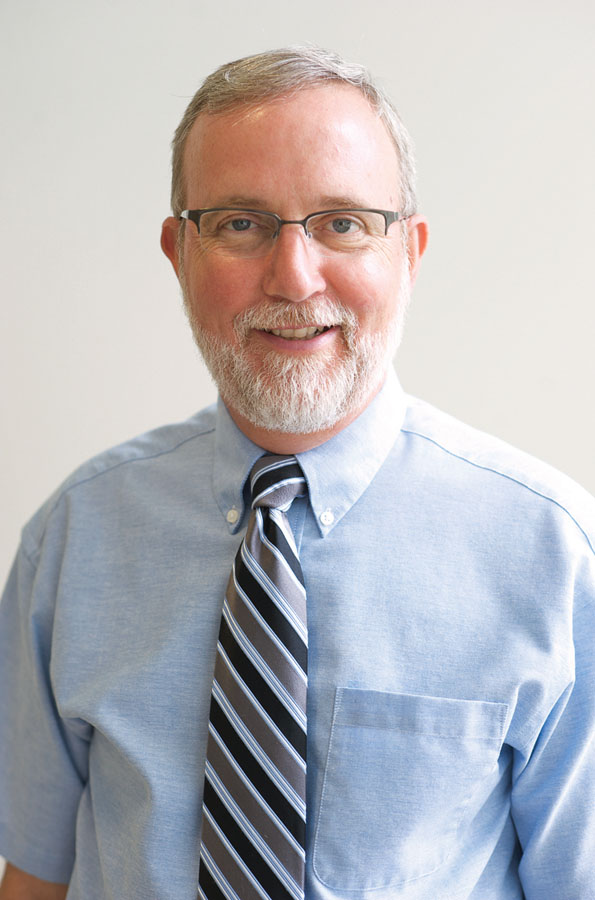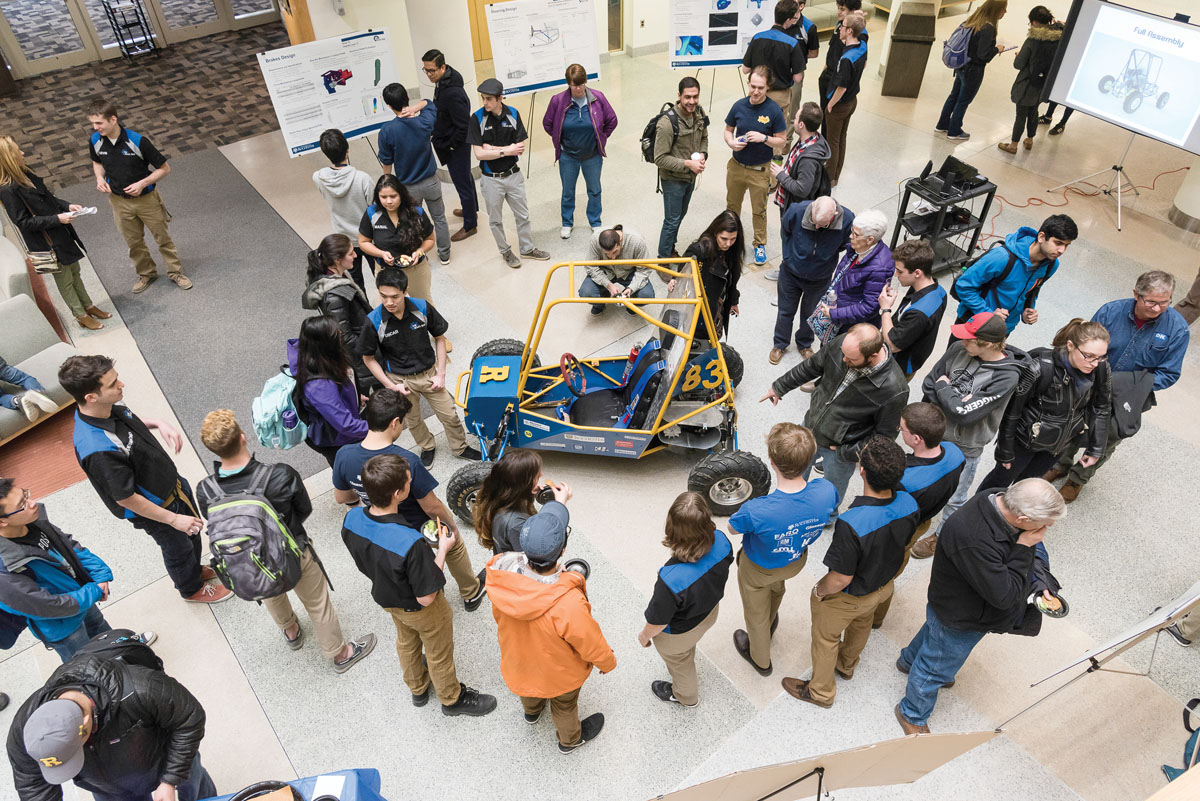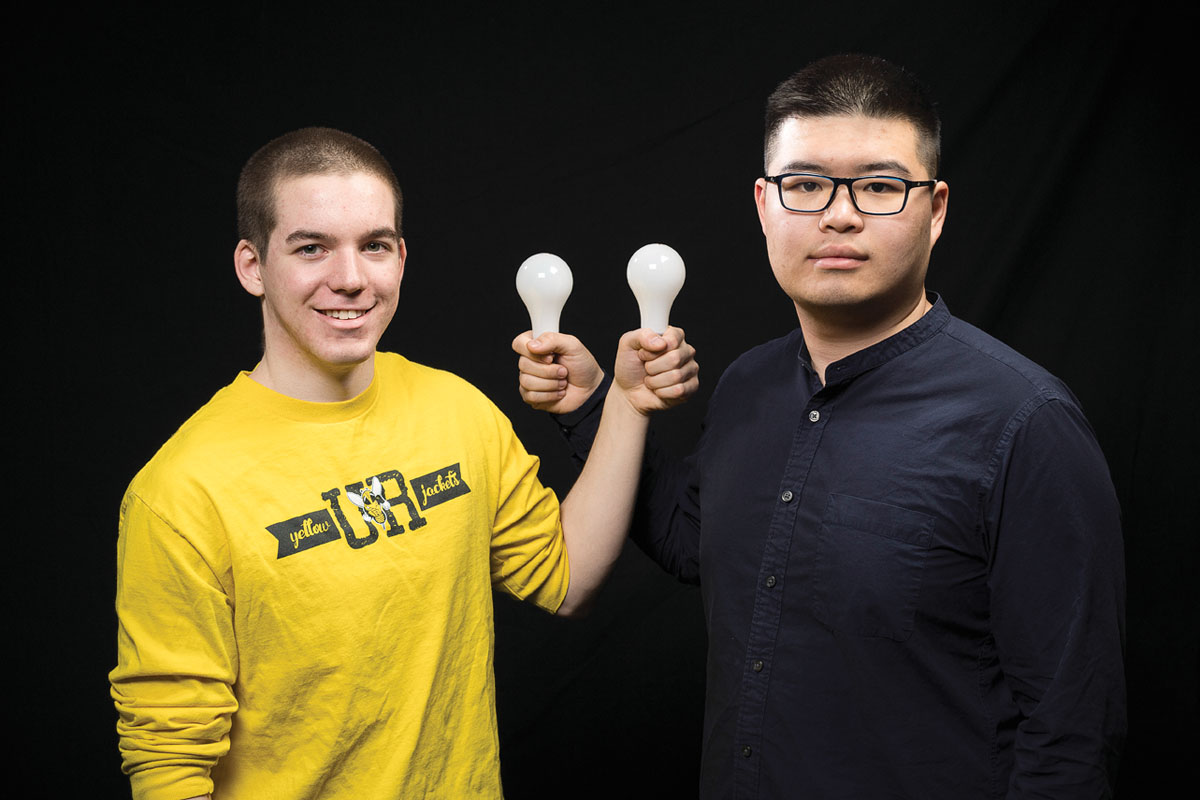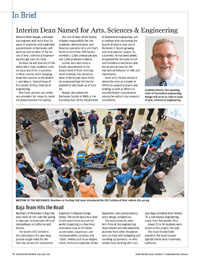In Review
 LEADING ROLES: The founding chair of biomedical engineering, Waugh will serve as interim dean of Arts, Sciences & Engineering. (Photo: University Communications)
LEADING ROLES: The founding chair of biomedical engineering, Waugh will serve as interim dean of Arts, Sciences & Engineering. (Photo: University Communications)Richard (Rick) Waugh, a biomedical engineer with more than 35 years of academic and leadership appointments at Rochester, will serve as interim dean of the faculty of Arts, Sciences & Engineering through June 30, 2018.
As dean, he will lead one of the University’s main academic units during a search for a successor to Peter Lennie, who’s stepping down this summer as the Robert L. and Mary L. Sproull Dean of the Faculty of Arts, Sciences & Engineering.
Rob Clark, provost and senior vice president for research, made the announcement this spring.
The role of dean of the faculty includes responsibility for the academic, administrative, and financial operation of a unit that’s home to more than 350 faculty members, 5,200 undergraduates, and 1,200 graduate students.
Lennie, who also holds a faculty appointment in the Department of Brain and Cognitive Sciences, has served as dean of the faculty since 2006. He announced last fall that he planned to step down as of June 30.
Waugh, who joined the Rochester faculty in 1980, is the founding chair of the Department of Biomedical Engineering, and is credited with overseeing the launch of what is now one of Rochester’s fastest-growing and most popular majors. As a scientist, he has been widely recognized for his study of cell and membrane mechanics and the structural basis for the mechanical behavior of cells and membranes.
Since 2013, he has served in University roles as a leader in efforts to expand research and funding, as well as efforts to raise Rochester’s prominence among the nation’s top research universities.
 MEETING OF THE MECHANICS: Members of the Baja SAE team introduced the 2017 edition of their vehicle this spring. (Photo: Adam Fenster)
MEETING OF THE MECHANICS: Members of the Baja SAE team introduced the 2017 edition of their vehicle this spring. (Photo: Adam Fenster)Baja Team Hits the Road
Members of Rochester’s Baja SAE team went on the road this spring to take part in important off-road competitions in California and Kansas.
The team’s 2017 vehicle is the culmination of a year-long process to get ready for the four-day Society for Automotive Engineers Collegiate Design Series. The series features a total of 100 teams from around the world competing in a four-hour endurance race; in hill climb, acceleration, suspension, and maneuverability contests; and “static” events such as an engine check, technical inspection, brake inspection, sales presentations, and a design competition.
The team draws its members from all the engineering departments and also welcomes students from other disciplines who can help with budgeting and rounding up sponsors—or who simply enjoy working with cars, says Baja president Kevin Bonko ’17, a mechanical engineering major from Painseville, Ohio.
About 25 to 30 students were active on the project this year.
The team finished 14th overall at the Quail Canyon Special Events Area in Gorman, California.
Books with Rochester Ties Win National Recognition
Two nonfiction books with connections to Rochester and the University’s archives in Rush Rhees Library were in the national limelight this spring.
A biography of one-time student and noted American author Shirley Jackson ’38 won the National Book Critics Circle Award. The book, Shirley Jackson: A Rather Haunted Life, by Ruth Franklin, includes a never-before analyzed short piece of fiction that Jackson wrote when she was a student at Rochester.
The work was uncovered in Rush Rhees while Franklin was doing research for the book. Jackson, best known for her short story “The Lottery,” left Rochester while an undergraduate and eventually finished her degree at Syracuse.
The collected papers of a Rochester civil rights leader played an important role in the research for this year’s Pulitzer Prize–winning book in history. Blood in the Water: The Attica Prison Uprising and Its Legacy, by Heather Ann Thompson, is a comprehensive account of the 1971 prison riot at the Attica state prison and its political and social aftermath.
As part of her research, Thompson, a professor at the University of Michigan, consulted the Franklin Florence Papers in the Department of Rare Books, Special Collections, and Preservation.
 BRIGHT LIGHTS: Astronomy Club leaders Ryan Rubenzahl ’18 and Bo Peng ’18 helped organize a campus recognition of Earth Hour. (Photo: Adam Fenster)
BRIGHT LIGHTS: Astronomy Club leaders Ryan Rubenzahl ’18 and Bo Peng ’18 helped organize a campus recognition of Earth Hour. (Photo: Adam Fenster)Lights Out! Students Look to the Sky
Parts of the Wilson Quadrangle went dark for an hour this spring as a way to help people see what they may be missing in the sky.
In an effort organized by Ryan Rubenzahl ’18, president of the Astronomy Club, and Bo Peng ’18, vice president of the club, the nonessential lights of the Wilson Commons porch, Hirst Lounge, Bridge Lounge, Wilson Quad, and Rettner Atrium were turned off for an hour in late March.
The event was part of the World Wildlife Fund’s annual Earth Hour, designed to create awareness of climate change and light pollution. This was the second year that Rochester has participated. As part of the event, the Astronomy Club led a stargazing event on the quad, and other student groups set up posters and organized other presentations in Wilson Commons.
—Danielle Douglas ’17
Campuses Go Smoke Free
All University campuses will be tobacco-free—both inside and outside buildings—beginning in August.
University President and CEO Joel Seligman announced the tobacco-free policy last summer, noting that the initiative is consistent with Rochester’s stature as an academic and medical institution that promotes health and wellness, and as a welcoming workplace that’s comfortable for all faculty, staff, and students.
The University joins nearly 1,500 colleges and universities nationwide that have adopted tobacco-free policies.
Rochester’s policy restricts tobacco, e-cigarettes, and vaping on University properties, but provides for a small number of outdoor smoking shelters, in which people can use tobacco on the River Campus. Starting August 15, the shelters will be the only designated areas for smoking and other tobacco use on the River Campus.
 HUMANISTIC TOUCH: A new grant will support initiatives to engage students in research and other activities involving the humanities. (Photo: Adam Fenster)
HUMANISTIC TOUCH: A new grant will support initiatives to engage students in research and other activities involving the humanities. (Photo: Adam Fenster)Mellon Foundation Grant Recognizes Humanities
The University has received a $1 million grant from the Andrew W. Mellon Foundation to increase undergraduates’ engagement with the humanities at a time when enrollments in the humanities are lagging.
Titled “Humanities for Life,” the five-year initiative is designed to reach students early in their academic careers, to create opportunities for experiences outside the classroom and to foster community engagement.
Scheduled to begin in the fall, the project will extend beyond that time frame and features several components: support for undergraduate research and mentorship by faculty, development of new humanities curricula, increased community engagement, and the establishment of a shared reading program for incoming students.
The new grant is the second $1 million award from the Mellon Foundation to Rochester in the past half-decade. In 2013, the foundation committed that sum to create a fellowship program for graduate students in the humanities to explore new technology.
The foundation has also supported Rochester programs to work with other New York institutions in expanding the reach of the humanities, as well as to establish the Digital Humanities Institute for Mid-Career Librarians.
And it has awarded Rochester a Public Humanities Fellowship, administered through Humanities New York, to support advanced humanities graduate students in exploring the public application of their scholarly interests.

